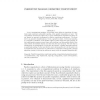Free Online Productivity Tools
i2Speak
i2Symbol
i2OCR
iTex2Img
iWeb2Print
iWeb2Shot
i2Type
iPdf2Split
iPdf2Merge
i2Bopomofo
i2Arabic
i2Style
i2Image
i2PDF
iLatex2Rtf
Sci2ools
111
click to vote
PPL
2006
2006
Inherently Parallel Geometric Computations
A new computational paradigm is described which o ers the possibility of superlinear and sometimes unbounded speedup, when parallel computation is used. The computations involved are subject only to given mathematical constraints and hence do not depend on external circumstances to achieve superlinear performance. The focus here is on geometric transformations. Given a geometric object A with some property, it is required to transform A into another object B which enjoys the same property. If the transformation requires several steps, each resulting in an intermediate object, then each of these intermediate objects must also obey the same property. We show that in transforming one triangulation of a polygon into another, a parallel algorithm achieves a superlinear speedup. In the case where a convex decomposition of a set of points is to be transformed, the improvement in performance is unbounded, meaning that a parallel algorithm succeeds in solving the problem as posed, while all se...
Related Content
| Added | 14 Dec 2010 |
| Updated | 14 Dec 2010 |
| Type | Journal |
| Year | 2006 |
| Where | PPL |
| Authors | Selim G. Akl |
Comments (0)

